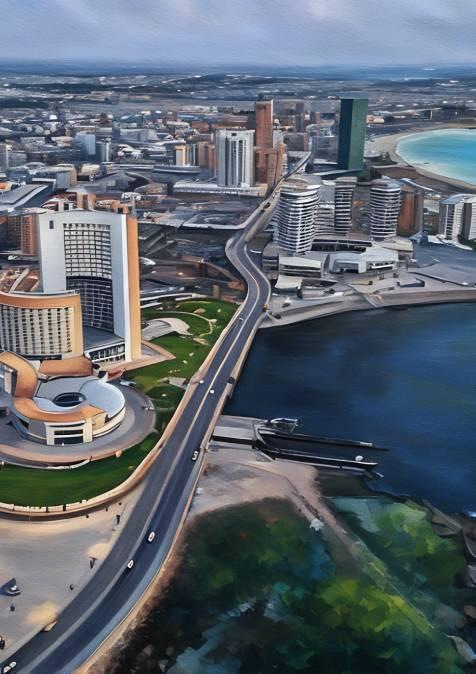RELATED CONTENT
-
 AuthorsZakaria ElouaourtiMarch 14, 2025This paper was originaly published on erf.org.eg Youth's life paths have become increasingly challenging, especially for those classified as "Not in Education, Employment, or Training" (NEET), who comprise 31.2% of North Africa's youth population. The region faces high youth unemployment rates, with 22.3% in 2023, rising slightly to 22.5% in 2024, and projected to return to 22.3% in 2025 (ILO, 2024). Notably, North African youth not only exhibit the highest desire to m ...
AuthorsZakaria ElouaourtiMarch 14, 2025This paper was originaly published on erf.org.eg Youth's life paths have become increasingly challenging, especially for those classified as "Not in Education, Employment, or Training" (NEET), who comprise 31.2% of North Africa's youth population. The region faces high youth unemployment rates, with 22.3% in 2023, rising slightly to 22.5% in 2024, and projected to return to 22.3% in 2025 (ILO, 2024). Notably, North African youth not only exhibit the highest desire to m ... -
 AuthorsMohamed ElmagbriMarch 13, 2025Libya faces a paradox: it has a bloated public sector employing millions, yet a crippling unemployment crisis, especially among young people. According to the Libyan Audit Bureau’s 2023 report[1], over two million people work for the government, a figure that excludes state-owned enterprises such as oil companies, banks, and utilities companies. With a total labor force of 2.5 million[2], out of every ten Libyan adults, eight are employed by the government. This massive public workf ...
AuthorsMohamed ElmagbriMarch 13, 2025Libya faces a paradox: it has a bloated public sector employing millions, yet a crippling unemployment crisis, especially among young people. According to the Libyan Audit Bureau’s 2023 report[1], over two million people work for the government, a figure that excludes state-owned enterprises such as oil companies, banks, and utilities companies. With a total labor force of 2.5 million[2], out of every ten Libyan adults, eight are employed by the government. This massive public workf ... -
AuthorsMarch 7, 2025Chaque jour, en moyenne, les femmes marocaines consacrent près de cinq heures à des tâches domestiques (cuisine, ménage, courses, soins aux enfants, etc.). Elles assurent plus de 90 % du temps total consacré aux tâches domestiques par l’ensemble des hommes et des femmes. Ce travail non rémunéré représente des services indispensables qui participent au bien-être matériel des personnes et des foyers sans pour autant apparaître dans la production nationale, telle que mesur ...
-
March 6, 2025In this episode, Vicky Aridi discusses the pivotal role of Youth Economic Opportunieis (YEO) 2030 in advancing Sustainable Development Goal (SDG) 8 by fostering decent employment opportunities. The conversation highlights the importance of promoting green jobs and sustainability, while ...
-
March 6, 2025In this episode, Gerold discusses the crucial role of education and entrepreneurship in unlocking opportunities for youth in Southern Africa. The conversation explores innovation ecosystems in the region and the importance of collaboration between entrepreneurs and policymakers to foste...
-
March 4, 2025شكلت قمة فوكاك 2024 لحظة حاسمة في مسار العلاقات الصينية الإفريقية، حيث تمخضت عن توقيع اتفاقيات كبرى تشمل قطاعات حيوية مثل البنية التحتية، الطاقة، التجارة، والصناعة. كما أعلنت الصين عن استثمارات بقيمة 50 مليار دولار لدعم التنمية في إفريقيا خلال السنوات الثلاث المقبلة، إلى جانب إطلاق عشر ...
-
Larabi Jaïdi, Tayeb GhaziFebruary 28, 2025Dans ce podcast, nous explorons le Ramadan sous différents angles : social, spirituel, éthique et économique. Nous mettons en lumière la solidarité, l'ascèse alimentaire, ainsi que l'impa ...
-
 AuthorsFebruary 24, 2025The Policy Center for the New South (PCNS) has for over a decade advocated for the pooling of expertise, perspectives and resources to benefit developing nations, in Africa, around the South Atlantic and across the South. The need to take inspiration from one another and share analysis and good practices with each other is as pressing as it has ever been, as countries of the South strive to accumulate knowledge, capture value added and move up the value chain. Our center has notably ...
AuthorsFebruary 24, 2025The Policy Center for the New South (PCNS) has for over a decade advocated for the pooling of expertise, perspectives and resources to benefit developing nations, in Africa, around the South Atlantic and across the South. The need to take inspiration from one another and share analysis and good practices with each other is as pressing as it has ever been, as countries of the South strive to accumulate knowledge, capture value added and move up the value chain. Our center has notably ... -
 AuthorsFebruary 21, 2025Africa First, But Africa Not Alone As the world grapples with economic fragmentation, geopolitical realignments, and an accelerating polycrisis, Africa finds itself at a historic crossroads. With its vast resources, demographic dynamism, and a growing consumer base, the continent has the potential to reshape global economic narratives. Yet, this potential remains constrained by inadequate infrastructure, limited access to global finance, and persistent structural vulnerabilities. I ...
AuthorsFebruary 21, 2025Africa First, But Africa Not Alone As the world grapples with economic fragmentation, geopolitical realignments, and an accelerating polycrisis, Africa finds itself at a historic crossroads. With its vast resources, demographic dynamism, and a growing consumer base, the continent has the potential to reshape global economic narratives. Yet, this potential remains constrained by inadequate infrastructure, limited access to global finance, and persistent structural vulnerabilities. I ... -
Helmut Sorge & Eduarda ZoghbiFebruary 21, 2025In this podcast, Atlantic Dialogues Emerging Leader Eduarda Zoghbi highlights the growing influence of the Global South and advocates for the inclusion of younger voices in global discuss ...




